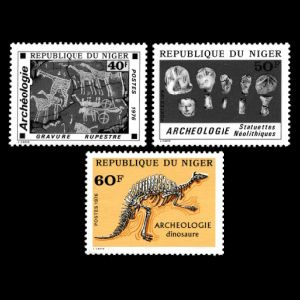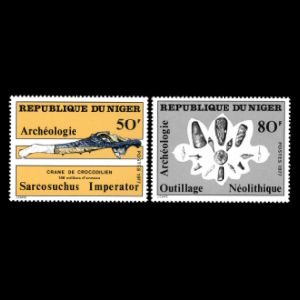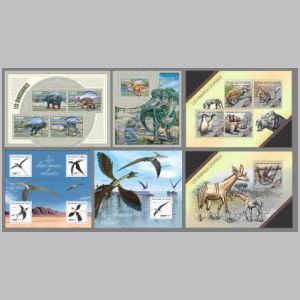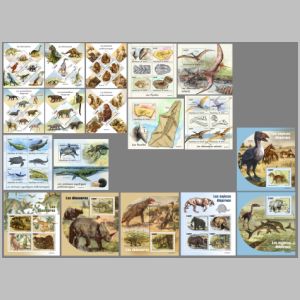the place where Paleontology and Paleoanthropology meets Philately
Niger
Fossils, dinosaurs, prehistoric animals and humans on stamps of Niger
| << previous country | back to index | next country >> |
Contents:
- Country overview
- Philately of Niger
- Official stamps of Niger related to Paleontology
- References
- Acknowledgements
Niger, officially the Republic of Niger, is a landlocked country in Western Africa, named after the Niger River. Niger is bordered by Libya to the northeast, Chad to the east, Nigeria to the south, Benin and Burkina Faso to the southwest, Mali to the west, and Algeria to the northwest. Niger became independent from France in 1960 and experienced single-party and military rule until 1991. Niger covers a land area of almost 1,270,000 km2, making it the largest country in West Africa, with over 80 percent of its land area covered by the Sahara Desert.
The country’s predominantly Muslim population is about 22 million. The capital city is Niamey, located in the far-southwest corner of Niger.
Niger is a developing country, and is consistently one of the lowest-ranked in the United Nations' Human Development Index. Much of the non-desert portions of the country are threatened by periodic drought and desertification. The economy is concentrated around subsistence and some export agriculture clustered in the more fertile south, and the export of raw materials, especially uranium ore.
Niger faces serious challenges to development due to its landlocked position, desert terrain, high fertility rates and resulting overpopulation without birth control, poor education and poverty of its people, lack of infrastructure, poor health care and environmental degradation. [R1]
In 1920, Niger was separated from Upper Senegal & Niger and became a separate colony. The first stamps used in the new colony were stamps of Upper Senegal and Niger overprinted TERRITOIRE DU NIGER in 1921.
The same stamps were surcharged in 1922. Since 1926, stamps marked prominently NIGER and in smaller letters AFRIQUE OCCIDENTALE FRANCAISE were issued.

|
| Register letter from Niger, with dinosaur stamps from 2013, sent to Germany in 2015. |
Stamps up to the 1970s tended to be large engraved issues similar to other former French colonies, including stamps featuring famous paintings like those of France. Later, more cheaply produced stamps were issued but designs continue to be large pictorials, typically of local relevance with some issues designed to appeal internationally to thematic stamp collectors. [R2]
In the first years since it independency, Niger's Post produced only few stamps a year.
Between 1996 and 2001 Impressor SA agency from Switzerland produced over 100 stamps on behalf of Niger a year.
In 2013, Niger became a client of Stamperija, which produces many hundreds of stamps per year for the country. In 2019, over 800 stamps were produced by Stamperija for Niger! Because of this, most of the Niger stamps shown below are marked undesirable for collecting.
Official stamps of Niger related to Paleontology: fossils, dinosaurs, prehistoric animals and humans
| 15.11.1976 "Archeology" [1] | 14.12.1977 "Archeology" [2] | 10.12.1996 "Dinosaurs" |
 |
 |

|
 |
 |
 |
 |
 |
 |
 |
 |
 |
|
20.04.2023 "Theory of Evolution"
20.04.2023 "165 years since Charles Darwin publishes his theory of evolution" 20.04.2023 "Extinct species" 20.04.2023 "Dinosaurs" 22.12.2023 "215th anniversary of Charles Darwin" 22.12.2023 "Prehistoric humans" 22.12.2023 "Flying dinosaurs" 22.12.2023 "Prehistoric water animals" 22.12.2023 "Fossils" 22.12.2023 "Dinosaurs" 22.12.2023 "Prehistoric reptiles" 22.12.2023 "Prehistoric humans" |
||
 |
 |
 |
Notes:
[1] One stamp from the set shows the skeleton of a dinosaur, Ouranosaurus nigeriensis.
Ouranosaurus nigeriensis is a 7 m-long iguanodont dinosaur.
It was discovered in 1973, in 110 million-year-old Early Cretaceous deposits in the Saharan wastes of Niger.
This African cousin of the European dinosaur Iguanodon was described in 1976 by French palaeontologist Philippe Taquet.
One notable feature of this dinosaur is the tall, narrow, fin-like crest along its back. It is thought that this fin radiated excess body heat during the midday and absorbed heat when the sun was low. [R3]
[2] Skull of prehistoric crocodile Sarcosuchus Imperator that lived 112 million years ago, depicted on yellow stamp
[3] "Flying dinosaurs" is not a correct term to apply to the animals shown on these stamps. The animals pictured are pterosaurs. Pterosaurs are a group of flying reptiles in the Archosauria. Reptiles in the archosaurs include crocodiles, dinosaurs, and pterosaurs.
References:
- [R1] Niger: Wikipedia, WikiTravel, FlagCounter.
- [R2] Postal History and Philately of Niger:
Wikipedia,
"In quest for abusive and undesirable stamp issues" by Jari Majander, published in Nr. 29 of TCNews (p. 24-64),
Links to official website of the Post Authority, stamp catalog and a list of new stamps of Niger are here - [R3] Ouranosaurus nigeriensis: Wikipedia, Natuire.ca.
Acknowledgements:
Many thanks to Dr. Peter Voice from Department of Geological and Environmental Sciences, Western Michigan University, for reviewing the draft page and his very valuable comments.
| << previous country | back to index | next country >> |